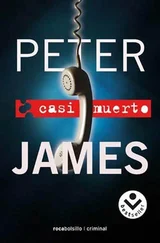Peter James - Perfect People
Здесь есть возможность читать онлайн «Peter James - Perfect People» весь текст электронной книги совершенно бесплатно (целиком полную версию без сокращений). В некоторых случаях можно слушать аудио, скачать через торрент в формате fb2 и присутствует краткое содержание. Жанр: Триллер, на английском языке. Описание произведения, (предисловие) а так же отзывы посетителей доступны на портале библиотеки ЛибКат.
- Название:Perfect People
- Автор:
- Жанр:
- Год:неизвестен
- ISBN:нет данных
- Рейтинг книги:4 / 5. Голосов: 1
-
Избранное:Добавить в избранное
- Отзывы:
-
Ваша оценка:
- 80
- 1
- 2
- 3
- 4
- 5
Perfect People: краткое содержание, описание и аннотация
Предлагаем к чтению аннотацию, описание, краткое содержание или предисловие (зависит от того, что написал сам автор книги «Perfect People»). Если вы не нашли необходимую информацию о книге — напишите в комментариях, мы постараемся отыскать её.
Perfect People — читать онлайн бесплатно полную книгу (весь текст) целиком
Ниже представлен текст книги, разбитый по страницам. Система сохранения места последней прочитанной страницы, позволяет с удобством читать онлайн бесплатно книгу «Perfect People», без необходимости каждый раз заново искать на чём Вы остановились. Поставьте закладку, и сможете в любой момент перейти на страницу, на которой закончили чтение.
Интервал:
Закладка:
John’s work at USC involved the creation and study of virtual life forms – something that married his interests in both physics and biology, and was a dream project for him. After six years he was now up for tenure – something that would have been a certainty for him had Dr Katzenberg still been head of his department.
But a year ago, Dr Katzenberg was headhunted by a software company in Silicon Valley, which made him an offer he apologetically told John that not even God could have refused. Now, with less than a year of the project to run, the prospect of further funds did not look good, and nor did the likelihood of tenure for many of his colleagues on the project, who were starting to file applications elsewhere.
John had been brought up in Orebro, a small, beautiful university town in the centre of Sweden that was built around the banks of a river, and had a moated medieval castle in its centre. In summer he’d cycled through a park to school, and in winter when there was thick snow he’d skied there. He liked to walk, he liked open spaces, feeling free. In LA he sometimes felt hemmed in.
Even more than Naomi did, he missed the big changes in the seasons. He loved the long hours of daylight, and the summers were great, but he really hankered at times for the cold sharp tang of autumn and the sense of the approach of winter. And he missed the snow most of all. Sure, they could drive to the mountains and go skiing at weekends, or take a short, cheap flight to Telluride or Park City or any of a whole bunch of great ski resorts, but he missed that snow falling outside the windows, covering the garden and the cars. He missed the spring. He missed the sense of community.
Perhaps it was the same in any large city.
He turned off Jefferson into Gate 8, nodded at the attendant in his booth and pulled into a parking bay. Then, hitching his laptop bag over his shoulder, he walked back onto Jefferson, and crossed McClintock, a short distance from the Shrine. This area was fine in daytime, but at night students and staff either walked in a large group, or got escorted by a security guard back to the parking lots. It was that kind of a neighbourhood.
The dark and violent underbelly of the city had, mercifully, never touched either him or Naomi and he rarely gave it any thought. It was the constant reminders of Halley all around, everywhere in the city, that affected both of them. Santa Monica was the worst. For the best part of a year, St John’s Hospital in Santa Monica had become a second home for them. He and Naomi had taken turns at sleeping on a cot in Halley’s room. Watching him deteriorate. Hoping for some miracle that was never going to happen.
Sometimes, even just hearing the name Santa Monica brought pain. He had hoped that would change when Luke was born, that they could start living their lives forwards again, instead of always being in the shadow of the past. But now, with Dr Rosengarten’s pronouncement, even their hopes for a new beginning were in a mess.
Christ, what the hell have I got us into?
Deep in thought, he entered the four-storey building and took the elevator up to the third floor, where the department of cognitive sciences was housed. Several students were milling around in the corridor as he emerged, familiar faces, but only a couple he could put a name to. It was lunch time. Ordinarily he’d be taking a break now, instead of arriving to start his day.
A pretty Chinese-American girl suddenly blocked his path. ‘Hey, Dr Klaesson – could I talk to you for a moment? I have a real problem with something you said in your lecture last Thursday about Neural Darwinism, and I need to-’
‘Could we do this later, Mei-Ling?’
‘Sure – shall I stop by your office?’
‘About four – would that work for you?’ He had no idea of his schedule this afternoon, but he just didn’t want to talk to anyone right now. He needed some time alone.
To think.
To get hold of Dr Leo Dettore.
‘Four’s good,’ she said.
‘Terrific.’ He walked on, down a shiny linoleum corridor lined on one side with grey metal filing cabinets and on the other with closed doors.
The last door on the left opened onto a room of ten computer workstations, four of which were occupied by some of his graduate and postdoctoral fellows. One was sitting back, semi-comatose, a can of Coke in his hand. Another was hunched over the screen in deep contemplation. His young postdoc, Sarah Neri, her head a mass of tangled red hair, had her face inches from her screen, studying some graph. John tiptoed past into the sanctuary of his office, and closed the door behind him.
It was a decent, if soulless office, a generous size, with bland modern furnishings and a window, set a little high, with a view out over a quadrangle onto two other campus buildings. There was paperwork strewn over every flat surface in the room, including the visitor chairs and much of the floor, a Mac monitor and keyboard, and a whiteboard on the wall that was covered in scrawled algorithms and a barely legible diagram from an illustration he had made for a student.
Without removing his jacket he sat at his desk, pulled his laptop out of the bag and downloaded the files he had been working on last night at home, then checked his agenda for the afternoon.
‘Shit!’ he said out loud.
There was a six o’clock appointment he had completely forgotten about. A journalist from USA Today wanted to do a piece about his department. Normally it would have been handled by Saul Haranchek, who had taken over as head of the unit after Bruce Katzenberg’s departure, but Saul was out of town and had asked him to take the interview. John didn’t need this, not today of all days when he wanted to get home early, back to Naomi.
He tried Dettore’s number, but again got the answering machine. Then he rang Naomi at the production office.
She sounded low. ‘Did you try Dettore?’
‘Yes, I’m going to keep trying.’
‘What about a second opinion?’
‘Let me talk to him first. I’m afraid I’m going to be a little late back, I have to do an interview.’
‘It’s OK, I have to go to a screening I’d forgotten all about. Need it like a hole in the head. I won’t be back till at least nine. What do you want to do about food tonight?’
‘Want to go out? Have a Mexican somewhere?’
‘I’m not sure I could handle Mexican at the moment. Shall we see how we feel later?’
‘Sure,’ John said. ‘Love you.’
‘Love you, too.’
He hung up with a heavy heart, then opened his email inbox.
He had Dettore’s email address, and typed out a curt email, stating Dr Rosengarten’s diagnosis and asking him to phone him as a matter of great urgency.
He sent the email, then walked over to the window. Despite the cold wind and the spats of rain, quite a few people were out there. Some sitting on benches eating their lunches, some in groups, talking. One or two smoking. Students. No longer kids, but not yet adults. Their whole lives in front of them. Did they know what was coming up behind them?
He looked at one particularly hip group standing in their baggy clothes, with their topiaried heads, laughing, fooling around, so goddamn carefree. None of their parents had messed with their genes. But when their turn came, what would they do?
Did they know they were the last generation of kids left to chance? Did they realize that however smart they might think they were, they were going to grow up to find themselves a genetic underclass? That they were going to be faced with the chance to make their own kids infinitely smarter, stronger, healthier than they themselves could ever be?
What choices would they make?
Then he turned away from the window, afraid. Rosengarten could have made a mistake, sure, but if he hadn’t? If it was Dettore who had made the mistake, just how many other mistakes had he made?
Читать дальшеИнтервал:
Закладка:
Похожие книги на «Perfect People»
Представляем Вашему вниманию похожие книги на «Perfect People» списком для выбора. Мы отобрали схожую по названию и смыслу литературу в надежде предоставить читателям больше вариантов отыскать новые, интересные, ещё непрочитанные произведения.
Обсуждение, отзывы о книге «Perfect People» и просто собственные мнения читателей. Оставьте ваши комментарии, напишите, что Вы думаете о произведении, его смысле или главных героях. Укажите что конкретно понравилось, а что нет, и почему Вы так считаете.











